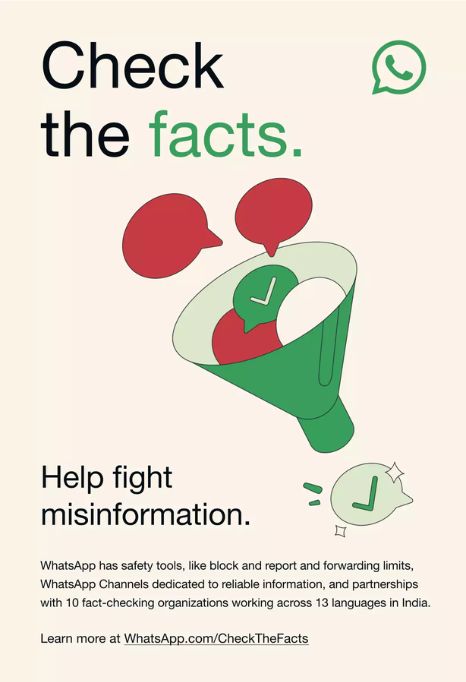WhatsApp has launched the “Check the Facts” campaign in India to combat the spread of misinformation, a proactive approach to user awareness and mitigate false information on its platform, as misinformation can spread quickly and easily.

WhatsApp is partnering with 10 Indian organizations, including Boom Fact-Check, Fact Crescendo, Factly, and The Healthy Indian Project, to provide verified and accurate updates on their WhatsApp channels. This move encourages users to be more discerning about information they receive and share, promoting a culture of informed communication.
Moreover, WhatsApp’s campaign does not just stop at partnerships. It goes a step further by highlighting its in-built features and safety tools. These include options to block and report, as well as forward labels that act as visual cues for users to be cautious about the information they disseminate. For instance, messages marked with a “forwarded many times” label can only be forwarded to one chat at a time. This limitation is a subtle yet effective way to make users think twice before sharing potentially misleading information.
Another critical aspect of WhatsApp’s strategy is the limitation on message forwarding. The app has set restrictions on how many times a message can be forwarded, a feature that serves as a brake on the viral spread of misinformation. When a message bears the “forwarded” label, it can only be shared with up to five chats and one group at a time. This restriction is a clear signal for users to reassess the content they’re about to spread, potentially slowing down the circulation of fake news.
WhatsApp’s “Check the Facts” campaign aims to improve digital safety and responsible communication among its user base. It integrates educational content, strategic partnerships, and app changes to combat misinformation. This initiative not only tackles fake news but also fosters a more informed and cautious user community, crucial in today’s digital age.











